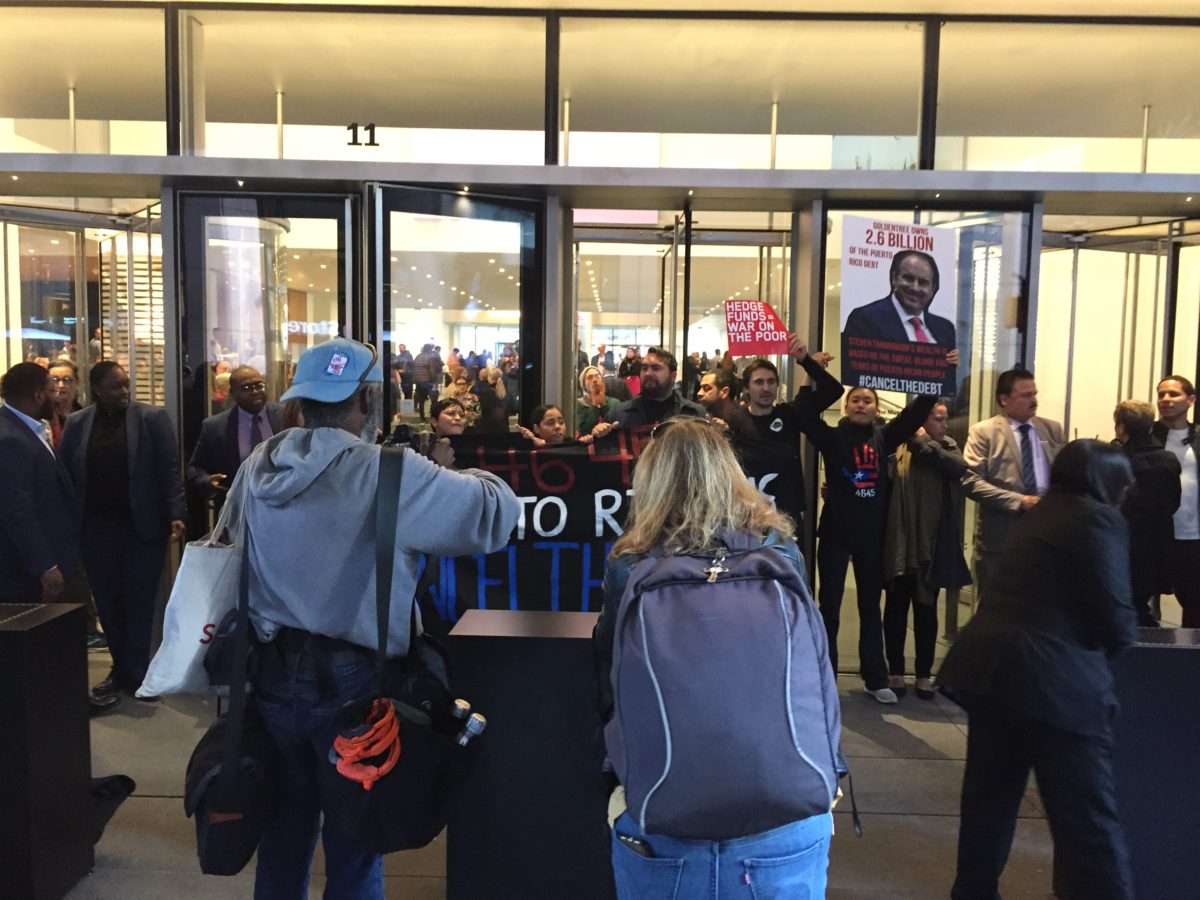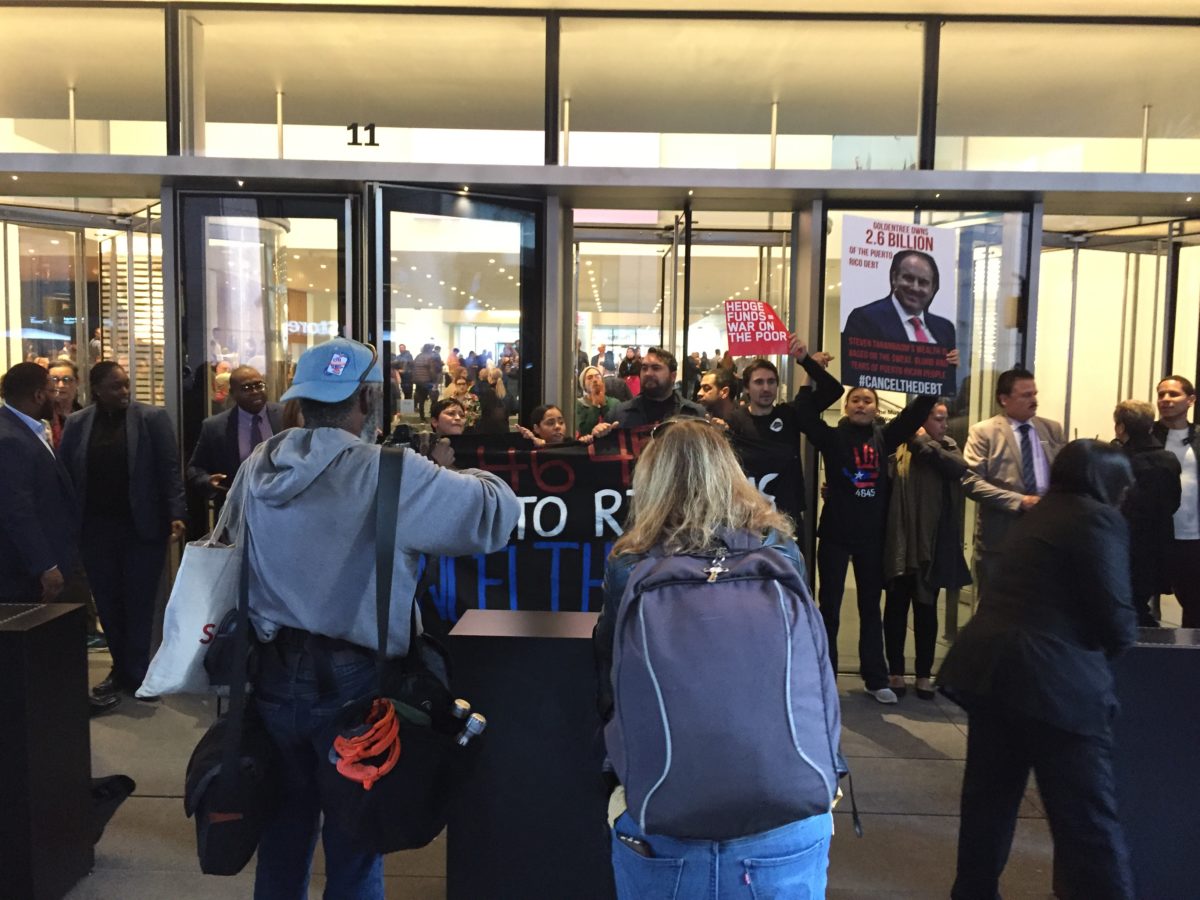[ad_1]

Protesters blocking entry to the Museum of Modern Art on October 21, 2019.
ALEX GREENBERGER/ARTNEWS
The Museum of Modern Art in New York, which officially reopened to the public on Monday morning after a $450 million expansion project, has been besieged by activists for the second time in four days. On Monday, as the museum prepared to welcome visitors, some were turned away and told to return later because protesters had blocked people from entering.
At a protest on Monday morning, activists gathered to demand the removal of Steven Tananbaum, a MoMA trustee, from the museum’s board. They say that Tananbaum, through his New York–based asset management firm GoldenTree Asset Management, owns $2.5 billion in debt from Puerto Rico, which is currently facing an economic crisis that has resulted in government austerity measures.
A representative for Tananbaum, who appears on the ARTenws Top 200 Collectors list, declined to comment. A spokesperson at MoMA did not respond to a request for comment.
At around 10 this morning, protesters blocked MoMA’s West 53rd Street entrance, which has been refurbished as part of the Diller Scofidio + Renfro–organized construction project. Activists barged through a barricade, pushed past security guards, and held a banner reading “#4645 / PUERTO RICANS / #CANCELTHEDEBT” in front of revolving doors. (The number on the banner refers to a statistic about the 4,645 people who died during Hurricane Maria in 2017, according to one study—a figure far higher than the one stated by government officials.) Around a half hour later, as protesters moved into the street, blocking traffic, the New York Police Department made seven arrests.
Among those arrested was Melissa Mark-Viverito, the Puerto Rican–born former speaker of the New York City Council. On Twitter, she wrote, “We will not be silenced and we will not stop until our voices are heard. People are not for profit.”
“Is this the kind of man you want on your board?” protesters chanted as confused visitors looked on. Members of activist coalitions such as New York Communities for Change, the Center for Public Democracy, and Churches United for Fair Housing were also present.
If the chants sounded familiar, it was because similar ones had been shouted in front of MoMA just several days before. On Friday, during a party held in celebration of the opening, activists gathered to demand that MoMA and another of its trustees, Larry Fink, cut ties to companies involved in private prisons. (Protesters said that MoMA uses Fidelity Investments, which has stakes in GEO Group and CoreCivic, two private-prison companies, to manage its pension fund. A spokesperson for the museum denied this in a statement to ARTnews.) At that protest, attendees briefly made their way into the party, bearing signs that encouraged MoMA and Fink to divest from such companies and invest in causes selected by communities affected by mass incarceration.
Though smaller in size than Friday’s protest, Monday’s action caused the greater stir. As museum security staff told visitors they couldn’t enter, protesters shouted, “MoMA, you cannot accept this blood money Steven Tananbaum has given you, and pretend to be a friend to Puerto Rico!”
Attendees related the crisis in Puerto Rico to ongoing strife in Lebanon and Chile, which are currently undergoing rebellions amid economic reforms put forward by local governments. They also drew connections between the Puerto Rican economic crisis and broader concerns about class struggle across America right now.
Calling Tananbaum’s connections to the crisis “Wall Street abuse at its highest,” Nicole Torres-Bruno, an activist from the #CanceltheDebt campaign, told the crowd, “This is a fight against crimes against humanity, and this is also a class issue!”
MoMA is only the latest in a string of museums to be hit by protests recently. Some groups have targeted institutions that have received funds from the Sackler family, which has been accused of fueling the opioid crisis. And in July, Warren B. Kanders resigned as vice chair of the Whitney Museum after protesters and artists decried his ties to companies that manufacture defense products and ammunition.
After blocking entry to MoMA for about a half hour, protesters moved to the street, where they formed a human chain. Police arrested seven people, many of whom chanted as their hands were bound. One protester addressed the lengthy line that had formed to enter MoMA, telling visitors, “MoMA has blood on its hands.”
[ad_2]
Source link

